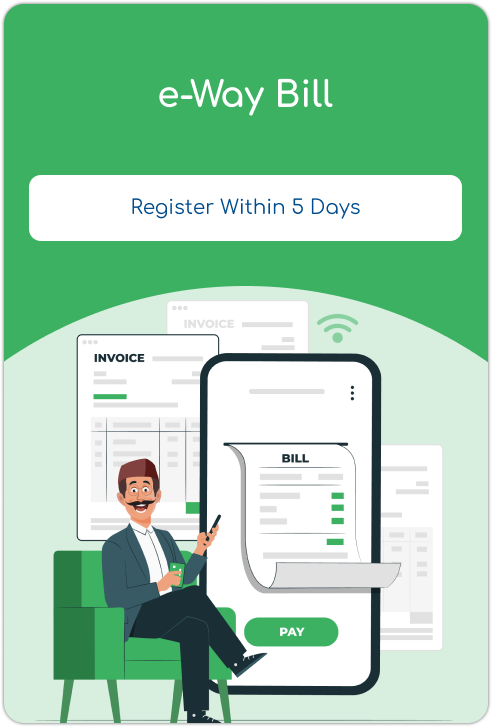
E-Way Bill Service
385 customers
What will you get?
E-Way bill
Annual Service (without any limit)
What do we Require?
INR 14225 Taxes As Applicable





Introduction
The E-Way Bill system is an electronic mechanism introduced under India's Goods and Services Tax (GST) regime to facilitate the smooth movement of goods across state borders. It requires registered taxpayers or transporters to generate an electronic waybill for goods valued above a specified threshold, ensuring transparency, efficiency, and compliance in the logistics and supply chain ecosystem. The system aims to replace cumbersome paperwork, reduce transit delays, enhance tax compliance, and curb tax evasion. It fosters greater accountability and transparency in the movement of goods, benefiting businesses, tax authorities, and consumers. The E-Way Bill system represents a significant milestone in India's digitized tax administration framework.
What is W-Way Bill?
An E-Way Bill (Electronic Way Bill) is an electronic document generated online for the movement of goods from one place to another, either within the same state (intra-state) or between different states (inter-state) in India. It contains details such as the type of goods, their value, origin and destination addresses, vehicle details, and GST identification numbers (GSTIN) of the parties involved in the transaction.
Eligibility:
For generating an E-Way Bill depends on the value of the goods being transported and the nature of the transaction:
- Inter-State Movement:E-Way Bills are mandatory for the movement of goods valued at more than Rs. 50,000 in value in relation to a supply, whether for sale, transfer, or any other reason, from one state to another. This applies to both taxable and non-taxable supplies under GST.
- Intra-State Movement:The threshold for E-Way Bill generation for intra-state movement of goods varies from state to state. However, it is generally set at Rs. 50,000 or above for most states. Some states may have a lower threshold.
- Registered Persons:Registered persons under GST, including the supplier, recipient, or transporter of goods, are required to generate E-Way Bills for the movement of goods as per the specified thresholds.
- Unregistered Persons:Even unregistered persons who are involved in the transportation of goods valued at more than Rs. 50,000 are required to generate E-Way Bills.
- Specific Circumstances:E-Way Bills may also be required in certain specific circumstances, such as for job work transactions, movement of goods for reasons other than supply (e.g., for exhibitions or for own use), and in cases where goods are transported by a principal to a job worker and back.
The E-Way Bill system offers several key benefits for transportation:
- Streamlined Documentation:E-Way Bills replace the traditional paper-based waybills with electronic documents, streamlining the documentation process for transporting goods. This reduces paperwork, manual errors, and administrative burdens for transporters.
- Real-Time Tracking:E-Way Bills enable real-time tracking of goods in transit, allowing transporters and businesses to monitor the movement of their shipments at every stage. This enhances visibility and control over logistics operations, leading to improved efficiency and timely deliveries.
- Reduced Transit Delays:With E-Way Bills, transporters can generate the required documentation electronically before commencing the transportation of goods. This helps in avoiding delays at state borders and checkpoints, resulting in faster transit times and smoother logistics operations.
- Compliance with GST Regulations:The E-Way Bill system ensures compliance with Goods and Services Tax (GST) regulations by providing a standardized electronic mechanism for documenting the movement of goods. This helps transporters and businesses avoid penalties and legal repercussions associated with non-compliance.
- Enhanced Security:E-Way Bills include detailed information about the consignment, such as its origin, destination, and product details. This enhances security and reduces the risk of theft or pilferage during transit by providing an electronic record of the goods being transported.
- Cost Savings:By eliminating the need for manual paperwork and reducing transit delays, E-Way Bills contribute to cost savings for transporters and businesses. They help in optimizing route planning, minimizing fuel consumption, and reducing operational expenses associated with logistics.
- Improved Customer Service:With better visibility and control over the movement of goods, transporters can provide improved customer service by offering accurate delivery estimates, proactive notifications, and timely updates on shipment status to their customers. Overall, the E-Way Bill system offers numerous benefits for transportation by simplifying documentation, enhancing tracking capabilities, reducing transit delays, ensuring compliance with GST regulations, enhancing security, reducing costs, and improving customer service. It is a valuable tool for optimizing logistics operations and facilitating the seamless movement of goods across state borders.
Components of E-Way Bill
The E-Way Bill comprises several key components, each providing essential information about the goods being transported and the parties involved in the transaction. The main components of an E-Way Bill include:
- E-Way Bill Number:A unique identification number generated for each E-Way Bill, which serves as a reference for tracking the movement of goods.
- Transporter ID:The unique identification number of the transporter responsible for transporting the goods. This can be the transporter's GSTIN, transporter ID provided by the government, or vehicle registration number.
- Document Number:The document number associated with the invoice, bill of supply, or delivery challan related to the transportation of goods. This helps in linking the E-Way Bill to the relevant transaction document.
- Date and Time of Generation:The date and time when the E-Way Bill was generated, indicating the start of the validity period for the E-Way Bill.
- Goods Description:A detailed description of the goods being transported, including their name, quantity, unit of measurement, and value. This information helps in identifying the goods and determining their tax liability.
- HSN or SAC Code:The Harmonized System of Nomenclature (HSN) code for goods or the Service Accounting Code (SAC) for services, which classifies the goods or services for taxation purposes.
- Origin and Destination Addresses:The addresses of the place of dispatch (origin) and the place of delivery (destination) of the goods. This helps in identifying the locations involved in the transportation process.
- GSTIN of the Parties:The Goods and Services Tax Identification Number (GSTIN) of the supplier, recipient, and transporter involved in the transaction. This ensures compliance with GST regulations and facilitates the identification of the parties involved.
- Transportation Details:Information about the mode of transportation (road, rail, air, or ship), vehicle number or conveyance details, and the approximate distance to be covered during transportation.
- Validity Period:The period, for which the E-Way Bill is valid, indicating the duration within which the goods must reach their destination. The validity period varies based on the distance covered by the transportation.

